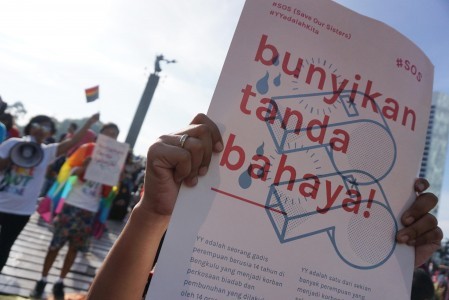Popular Reads
Top Results
Can't find what you're looking for?
View all search resultsPopular Reads
Top Results
Can't find what you're looking for?
View all search resultsCastration punishment ineffective: Komnas Perempuan
Change text size
Gift Premium Articles
to Anyone
T
he National Commission on Violence against Women (Komnas Perempuan) has expressed its opposition to the use of chemical castration against sexual offenders, saying it is ineffective in preventing crime.
Chemical castration is an additional punishment for those declared guilty of committing sexual violence against children, as stipulated in a recently issued regulation in lieu of law (Perppu) on sexual violence against children.
Komnas Perempuan commissioner Sri Nurherwati said rapists often reoffended because they could avoid prosecution, as many victims were reluctant to report their crimes to the police due to the feeling of shame and social stigma.
“The main challenge to eliminate sexual violence is to fight the impunity of perpetrators,” said Sri at a recent discussion.
“Castration may scare the perpetrators. However, it may have no deterrent effect on them, because they can find ways to commit their action without leaving enough evidence,” she added.
Komnas Perempuan stressed the need for the state to improve criminal procedural law to support police investigators in collecting evidence on cases of sexual violence.
Besides being ineffective, chemical castration was also costly for the state, because the substance needed to be injected once every three months, Sri added.
Therefore, Komnas Perempuan demanded that the House of Representatives immediately deliberate and pass the bill on the eradication of sexual violence, so that the country would have “better regulations” to fight what President Joko “Jokowi” Widodo called an extraordinary crime.
“The law is expected to simplify the process of reporting sexual abuse to the police to makes sure criminals face justice,” Sri said, adding that the law was also expected to pay serious attention to the fate of the victims, including the requirement for the state to provide counseling and rehabilitation to heal their trauma.
Sri also criticized a commonly held view in society that blamed victims, arguing that women should cover their bodies to avoid such crimes.
She pointed to the case of YY, a victim of gang rape in Bengkulu, who wore a hijab and uniform when the crime happened, similarly to EF, who became a victim of gang rape in Tangerang. “If the general public is still concerned with the women’s attire, the perpetrators will have reason to justify their wrongdoing,” Sri said.
The most important thing was for the public to stop looking at women as sexual objects. Also, any form of discrimination against women should be eliminated to prevent sexual violence in the future, she said.(bbn)










